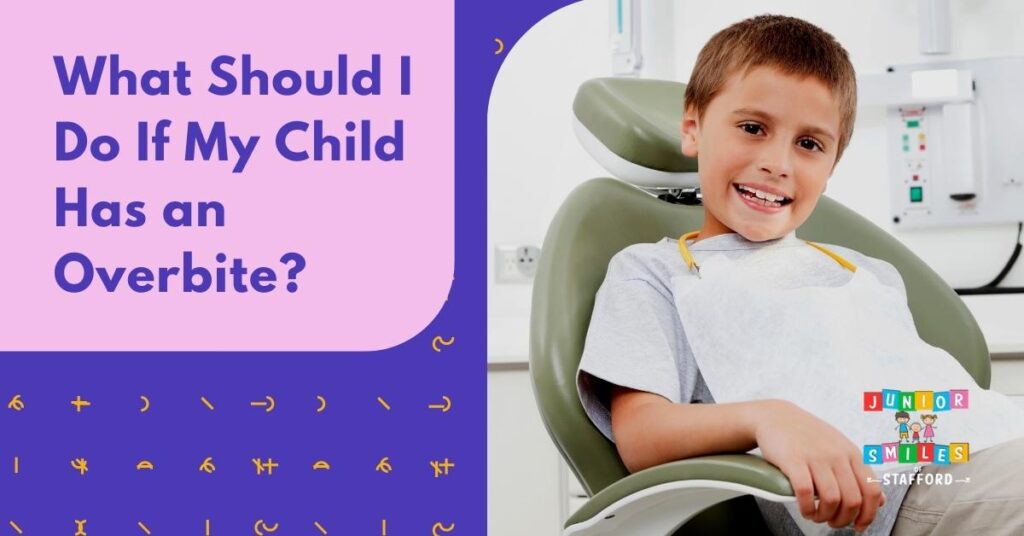What Should I Do If My Child Has an Overbite?

Malocclusions, or “bad bites” like overbites, are frequent and can affect people of any age. While it’s true that some children are born with an overbite and never outgrow it, parents need to know that there are measures they can take now to reduce the likelihood that their child will acquire an overbite that will require treatment down the road.
Most children have an overbite when the top front upper teeth protrude ahead of the bottom teeth. This is normal and will usually correct itself as the child grows. In some cases, however, an overbite can become more pronounced and may require treatment.
If your child has an overbite, you can best consult with their dentist or orthodontist. They will be able to assess the severity of the overbite and recommend treatment options accordingly.
If you want to know more about overbite, its causes, and which orthodontic treatment is suitable for your child, read more.
Overbite in Kids
One of the most common orthodontic issues in kids is an overbite. This is a condition where the upper teeth protrude farther out than the lower teeth. The severity of overbite varies from person to person, but in general, it can cause difficulty eating and speaking, as well as discomfort and self-consciousness.
There are a number of reasons why kids may have an overbite, including genetics, imbalances in the jaw muscles, or thumb sucking. In some cases, an overbite may be treatable with simple behavioral changes or appliances, but in other cases, surgery may be necessary.
Overbite Causes
Overbites are most common in children and, if untreated, can persist into adulthood. An overbite can begin to show in youngsters as young as two years old, and it can worsen rapidly.
Early Development
As parents, you often worry, “Will an overbite in a toddler repair itself?” when we observe the emergence of an overbite. A 2-year-old’s jaw and mouth are still developing, so it may look like they have a significant overbite at times. A dentist may advise you to wait a few years to watch how your child’s overbite develops. Alignment of the jaw and mouth can occur naturally with time.
You can get a second opinion from a pediatric orthodontist if you’re concerned that your child’s overbite is still severe after the age of 7.
Genetic Overbite
You can’t change your family history. If your child’s overbite is genetic, you will have to wait until they are seven years old before taking them to the orthodontist. The orthodontist will be able to assess the severity of the overbite and advise you on the best course of action to take.
Pacifier or Finger Sucking Habit
One of the leading causes of overbites in toddlers is the habitual use of a pacifier or thumb to replace chewing on their own teeth. The upper jaw and teeth can experience additional stress when a youngster uses a pacifier or a thumb to soothe sore gums. This stress can force the jaw and teeth forward, which can cause problems.
Using a pacifier or sucking on one’s thumb as a means of calming a fussy infant can be helpful. Between the ages of two and four, the majority of children will quit sucking their thumb or using a pacifier. The American Dental Association advises discouraging the pacifier sucking habit if your child hasn’t quit by the age of four.
Fixing or Preventing an Overbite
Here are three techniques to help reduce the possibility that your child will develop an overbite and require orthodontic treatment in the future.
Use The Right Sippy Cup
When your baby makes the switch from a bottle or breastfeeding to a sippy cup, it may be a very exciting time for you as a parent. The American Dental Association (ADA) cautions parents against buying typical spill-proof sippy cups because of the potential dental dangers they pose to children.
It is common knowledge that a child can get around the spill-proof valve of a sippy by sucking on the spout. Overbite and other oral issues might arise if a child habitually suckers on this valve.
In order to avoid oral development issues, you should restrict your child’s use of a sippy cup with a spout to mealtimes only and not allow them to suck on it constantly throughout the day.
Skip the sippy cup stage and go straight to a small plastic adult cup, or acquire a sippy cup with a “360” top that prevents accidents while still letting your child drink like an adult.
Read More: Can I Use Baking Soda on Toddler’s Teeth?
Frequently Asked Questions
At what age should an overbite be corrected?
If a child is two years old and has an overbite, it is likely to improve as they grow, and their adult teeth will also erupt. Orthodontists typically wait until a child is 7 or 8 years old to correct an overbite, even if it is severe. In some cases, you can fix an overbite in a newborn without surgery if the child stops sucking their thumb or pacifier.
If left untreated, an overbite can cause chewing, speaking, and swallowing problems. It can also lead to tooth wear and even jaw pain. In most cases, orthodontic treatment can correct an overbite without causing any problems.
Can a 3-year-old get braces?
A 3-year-old can get braces, but it is typically not recommended. The best time to get braces is around the age of 10-12, when the child’s baby teeth are still growing and their mouth is relatively small. If a child needs braces at a younger age, it may be because their teeth are crooked or crowded, which can cause problems with biting and chewing, and speaking clearly.
Do overbites get worse with age?
Yes, overbites can get worse with age. However, this is not guaranteed, as every individual’s mouth is different. Overbites typically worsen as the teeth and jaw continue to grow. Genetics can also influence how an individual’s overbite develops over time. Suppose you are concerned about your overbite worsening. In that case, it is best to have an orthodontic consultation right away to be more knowledgeable about the best-suited treatment plan for your child.
Does overbite affect speech?
Yes. Overbite can cause speech impediments because it changes how a person’s tongue and lips interact when forming sounds. For example, an overbite can cause a person to tongue-tip thrust, which is when the tip of the tongue protrudes too far forward and causes sounds to be pronounced incorrectly.
Read more: How Long is the Healing Time For Baby Tooth Extractions?
Contact Junior Smiles of Stafford to know more about overbites in Toddler
If you have any concerns about your toddler’s bite or think they may be showing signs of an overbite, please do not hesitate to contact a reputable pediatric dentist like Junior Smiles of Stafford. Our team of specialists will be more than happy to help assess the situation and provide you with the best possible treatment plan for your child.
Why Choose Junior Smiles of Stafford?
Our Stafford, VA team is well-versed in working with clients of various ages and backgrounds. They’ll take the time to get to know you and your family’s requirements, and they’ll work with you to design a treatment plan that suits your schedule. Sealants and fluoride treatments are just two of the many preventative care options we provide to keep your mouth healthy.
About Us
Visiting Junior Smiles of Stafford means you’re in good hands when it comes to receiving high-quality care. Your child’s dental health improves with each visit, ensuring a brighter smile for years to come. We adhere to the ADA and AAPD’s guidelines for best practices.
Where Are We Located?
Phone: (540) 699-2441
Fax: (540) 699-2464
Email: info@juniorsmilesofstafford.com
Monday and Tuesday: 9:00 AM – 5:00 PM
Wednesdays and Thursdays: 8:00 AM – 4:00 PM
Fridays and Saturdays: 9:00 AM – 2:00 PM (By appointment only)
How to Book Your Kids First Appointment at Junior Smiles of Stafford
Fill out the form on our website. Within 24 hours, a member of our team will get back to you.

